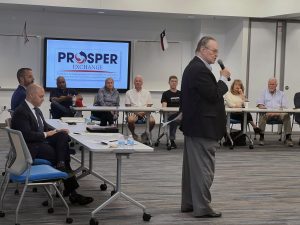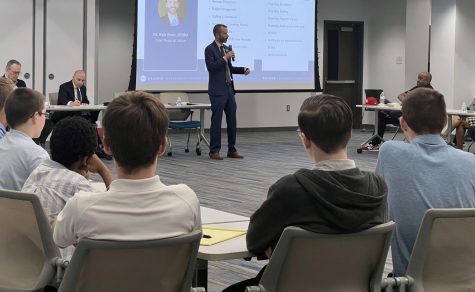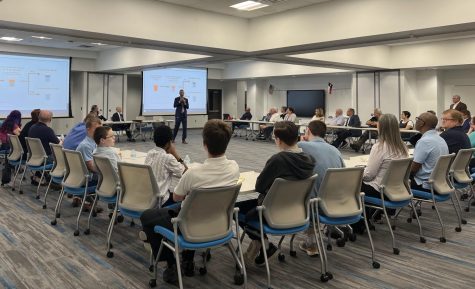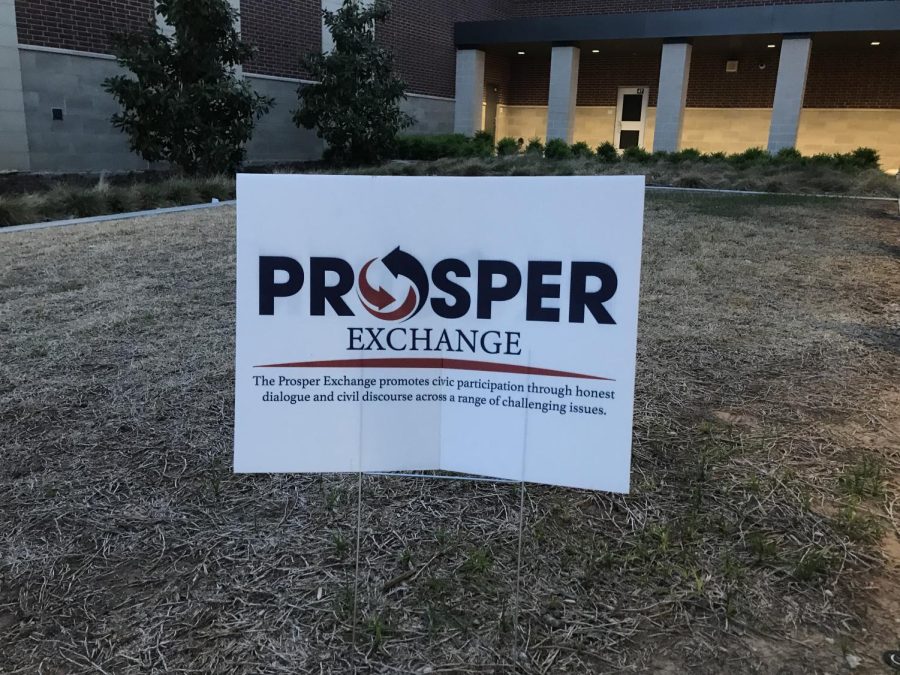Residents gather for town’s Prosper Exchange on taxation
A sign guiding attendees to the entrance to the Prosper Exchange held in Rock Hill’s LGI room is put up in the front of the school. “We wanted to create something through which we can create a better citizenry by educating,” Prosper mayor David Bristol said. The Exchange took place on Thursday, April 13 and was the second event of the series.
April 15, 2023
In introducing the topic of discussion on Thursday evening, Jason Galui, economics professor at Southern Methodist University and one of the minds behind Prosper Exchange along with mayor David Bristol, joked that “there are only two things in life that are certain: death and taxes.”
After the first Exchange over immigration on Jan. 12, the second of the series was held on Thursday, April 13 at Rock Hill High School’s LGI room, beginning at 6:30 p.m. Light refreshments such as cookies and water were provided. The topic of discussion was state and local taxation.
“We can’t have a conversation now about anything of any topic of any sort without people going to Facebook and [posting a] rant, and the fact that, in many cases, there’s very little education behind those opinions,” Mayor Bristol said in opening the Exchange. “As Jason [Galui] and I talked about it, we wanted to create something where we can create a better citizenry by educating.”

On their website, Prosper Economic Development Corporation describes the purpose of Prosper Exchange to “restore the balance of dialogue” and “promote civic participation through honest dialogue…across a range of challenging issues.” Being a relatively new initiative, organizers are continuing to account for public feedback in their plans moving forward.
“A key element of the Prosper Exchange is talking about how things work,” Galui said. “[This] is not a forum to debate what policy should or should not be, but to better understand how taxes work locally, how they’re collected, and what happens when they disperse and how they’re reused for places like Prosper ISD.”
Kenneth Maun, Collin county tax assessor-collector, spoke first about the history of taxation in Texas, setting up the context through which the state of taxation today came to be. His professional experience allows him to describe the initial routes of Prosper’s collected taxes, including recent challenges in the process after disruptions from the COVID-19 pandemic.

“We’re in an unfortunate time in our economic area in between inflation and population increase, and probably five other things that I’m not naming,” Maun said. “I think we’ve got a unique time to look at taxes, because everything’s going against it.”
With Prosper’s rapid growth over the past few years, its housing situation and, naturally, its financial and taxation climate have gone through substantial change. This includes the school district, whose enrollment projections have initiated plans for new schools, after Walnut Grove High School is set to open for the 2023-24 school year.
“[Prosper] definitely has unique challenges,” Dr. Kyle Penn, PISD chief financial officer and a guest speaker at the Exchange said. “We’re not just a size that is maintained. What we were two years ago is 6,000 less students, five or six less buildings, something like that, so what works today isn’t going to work in a year or two from now. We’re constantly reinventing the processes and the systems [to accommodate this].”
Before opening up the Exchange for public discussion, Penn details the use and allotment of tax dollars in public schools. He addresses common misconceptions and assumptions about school funding and introduces basic concepts to understand the structure in which taxes come to play.

“[PISD] is a giant operation, and I think people don’t realize the transportation, technology and everything in between [that goes into it],” Penn said. “You have limited resources, and everybody says, ‘it’s for the children, we need this for the children.’ It’s like if I say no, then I don’t love the children. It’s not that, it’s just that [the resources] are not there. That’s the hard part for me.”
Afterwards, attendees asked questions and put forth thoughts as Galui moderated the conversation, until the Exchange concluded around 8:00 p.m. The next Prosper Exchange will be on the topic of United States global leadership on a date still to be decided.








